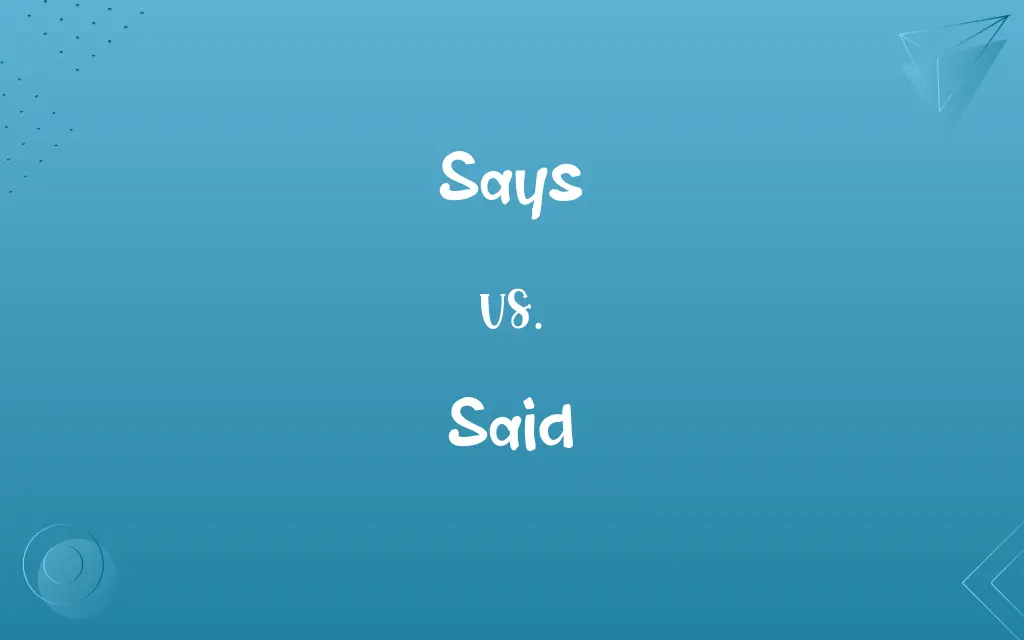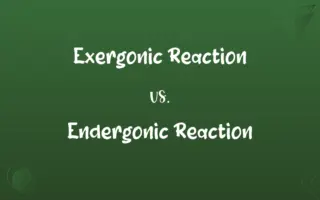Says vs. Said: Know the Difference

By Shumaila Saeed || Published on February 29, 2024
"Says" is the present tense form of "say," used for current or habitual statements, while "said" is the past tense, indicating a statement was made in the past.

Key Differences
"Says" is used in the present tense, indicating a current or ongoing action. It implies that the speaker is currently speaking or regularly makes a certain statement. Conversely, "said" is the simple past tense form of "say," used to indicate that the speaking action occurred at a specific, concluded time in the past.
Shumaila Saeed
Feb 29, 2024
In reported speech, "says" is used when relaying a statement that is still relevant or ongoing. For example, "He says he's going to the store" implies the action is current. "Said," however, is used for reported speech that occurred in the past, as in "He said he went to the store," indicating the action has already been completed.
Shumaila Saeed
Feb 29, 2024
When writing in the present tense, "says" is the appropriate choice. It's commonly used in journalism and news reporting to indicate ongoing or habitual statements. "Said," however, is used in narratives and accounts that are set in the past, as it situates the dialogue or statement in a past context.
Shumaila Saeed
Feb 29, 2024
"Says" can also imply a habitual action, as in "She always says she loves coffee." This suggests a repeated action. In contrast, "said" doesn't carry this connotation of repetition; instead, it simply refers to a specific instance in the past, as in "She said she loved coffee at the meeting yesterday."
Shumaila Saeed
Feb 29, 2024
The usage of "says" and "said" also affects the tone of a sentence. "Says" can make a statement feel more immediate and current, while "said" provides a sense of completion or distance from the action, as it places the statement firmly in the past.
Shumaila Saeed
Feb 29, 2024
ADVERTISEMENT
Comparison Chart
ADVERTISEMENT
Says and Said Definitions
Says
Used for habitual statements.
She always says honesty is the best policy.
Shumaila Saeed
Jan 21, 2024
Said
Past tense of 'say', used for past statements.
He said he was tired yesterday.
Shumaila Saeed
Jan 21, 2024
Said
Used in storytelling or recounting past events.
He said, 'I'll see you tomorrow.'
Shumaila Saeed
Jan 21, 2024
Says
Present tense of 'say', indicating current speech.
He says he'll be late to the meeting.
Shumaila Saeed
Jan 21, 2024
ADVERTISEMENT
Said
Implies past thoughts or feelings were expressed.
She said she loved the movie.
Shumaila Saeed
Jan 21, 2024
Says
To state as a determination of fact
It's hard to say who is right in this matter.
Shumaila Saeed
Jan 19, 2024
Said
Named or mentioned before; aforementioned
The party to the contract subsequently breached said contract.
Shumaila Saeed
Jan 19, 2024
Says
To give nonverbal expression to; signify or embody
It was an act that said "devotion.".
Shumaila Saeed
Jan 19, 2024
Said
Before-mentioned; already spoken of or specified; aforesaid; - used chiefly in legal style.
Shumaila Saeed
Jan 19, 2024
Said
Being the one previously mentioned or spoken of;
Works of all the aforementioned authors
Said party has denied the charges
Shumaila Saeed
Jan 19, 2024
Says
To make a statement or express an opinion or judgment
The story must be true because the teacher said so.
Shumaila Saeed
Jan 19, 2024
Says
The right or power to influence or make a decision
Citizens have a say in the councils of government. All I want is some say in the matter.
Shumaila Saeed
Jan 19, 2024
Says
Indicates an ongoing action in speech.
The teacher says homework is due tomorrow.
Shumaila Saeed
Jan 21, 2024
Repeatedly Asked Queries
Is "said" only for direct quotations?
"Said" can be used for both direct and indirect quotations in the past tense.
Shumaila Saeed
Feb 29, 2024
When should I use "said"?
Use "said" to report speech or statements that happened in the past.
Shumaila Saeed
Feb 29, 2024
How does "says" work in reported speech?
In reported speech, "says" indicates that the statement is still relevant or ongoing.
Shumaila Saeed
Feb 29, 2024
What does "says" indicate in a sentence?
"Says" indicates that someone is currently speaking or habitually makes a certain statement.
Shumaila Saeed
Feb 29, 2024
Can "says" be used for future statements?
"Says" is not typically used for future statements; it's for present or habitual speech.
Shumaila Saeed
Feb 29, 2024
Is "says" formal or informal?
"Says" is neutral and can be used in both formal and informal contexts.
Shumaila Saeed
Feb 29, 2024
Does "said" always need a subject?
Yes, "said" usually requires a subject to indicate who made the statement.
Shumaila Saeed
Feb 29, 2024
Can "said" imply habitual action?
No, "said" refers to a specific past instance and does not imply habitual action.
Shumaila Saeed
Feb 29, 2024
Can "says" and "said" be used interchangeably?
No, they cannot be used interchangeably due to their different tense implications.
Shumaila Saeed
Feb 29, 2024
What is the common context for using "says"?
"Says" is commonly used in journalism, real-time reporting, and present-tense narratives.
Shumaila Saeed
Feb 29, 2024
How does tense affect the use of "says" and "said"?
"Says" is present tense, while "said" is past tense, affecting their usage based on the time of the action.
Shumaila Saeed
Feb 29, 2024
Can "says" be used in past narratives?
"Says" is not typically used in past narratives; "said" is the correct choice for past tense narration.
Shumaila Saeed
Feb 29, 2024
Is "said" appropriate for current events?
For current events, "says" is more appropriate as it indicates present or ongoing statements.
Shumaila Saeed
Feb 29, 2024
Does "says" require direct speech?
"Says" can be used with both direct and indirect speech in the present tense.
Shumaila Saeed
Feb 29, 2024
Can "said" be used without quoting someone?
Yes, "said" can be used in reported speech without directly quoting the original speaker.
Shumaila Saeed
Feb 29, 2024
How does audience affect the use of "says" vs "said"?
The choice between "says" and "said" depends on whether you are conveying current or past statements to your audience.
Shumaila Saeed
Feb 29, 2024
Is "said" used in active or passive voice?
"Said" can be used in both active and passive voice, depending on the sentence structure.
Shumaila Saeed
Feb 29, 2024
Can "said" indicate a future action?
No, "said" is strictly for past tense and cannot indicate future actions.
Shumaila Saeed
Feb 29, 2024
Does "said" have a different meaning in legal contexts?
In legal contexts, "said" is used similarly, referring to statements made in the past.
Shumaila Saeed
Feb 29, 2024
Is "says" suitable for formal reports?
Yes, "says" can be used in formal reports, especially when citing current statements or opinions.
Shumaila Saeed
Feb 29, 2024
Share this page
Link for your blog / website
HTML
Link to share via messenger
About Author
Written by
Shumaila SaeedShumaila Saeed, an expert content creator with 6 years of experience, specializes in distilling complex topics into easily digestible comparisons, shining a light on the nuances that both inform and educate readers with clarity and accuracy.









































































